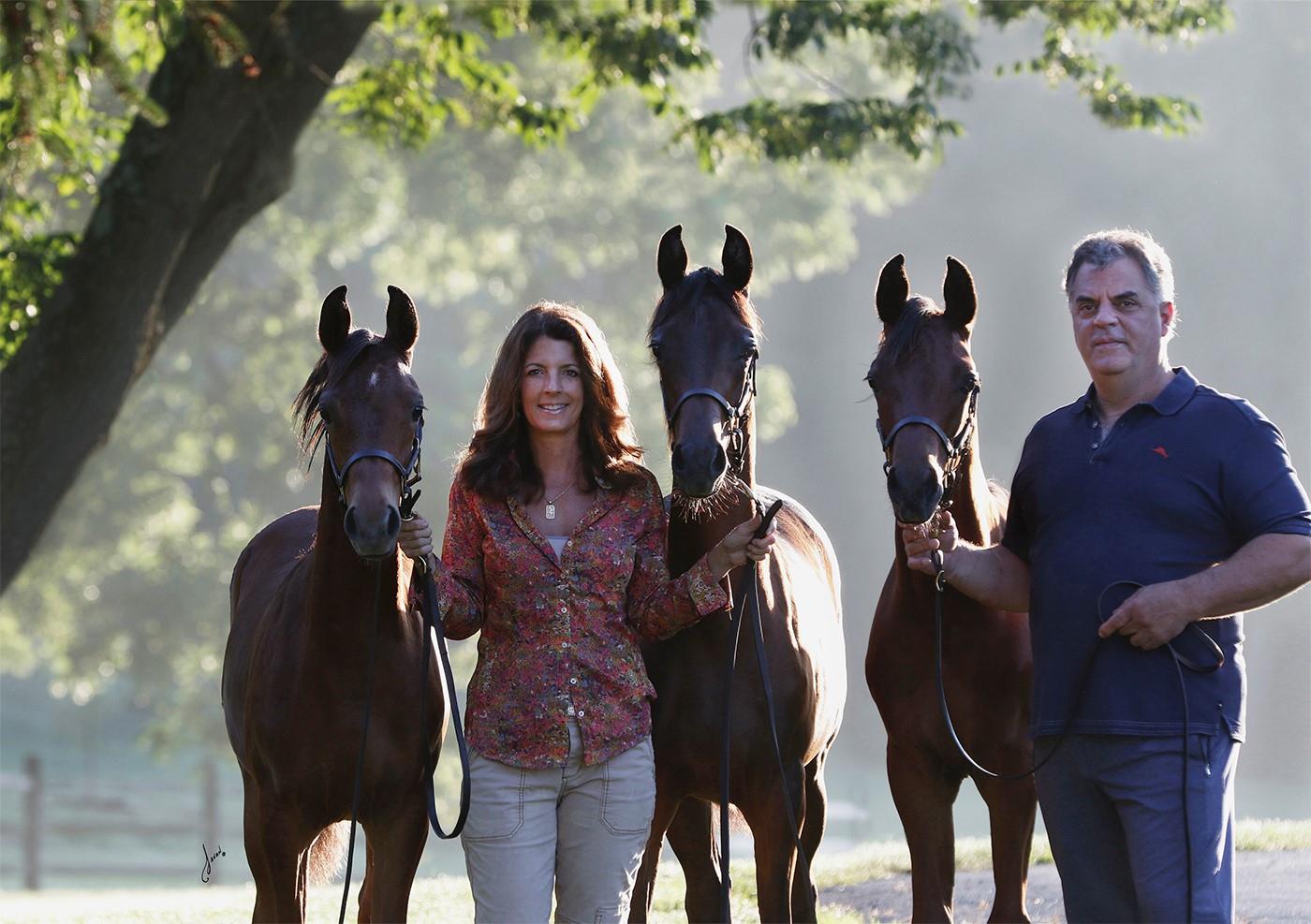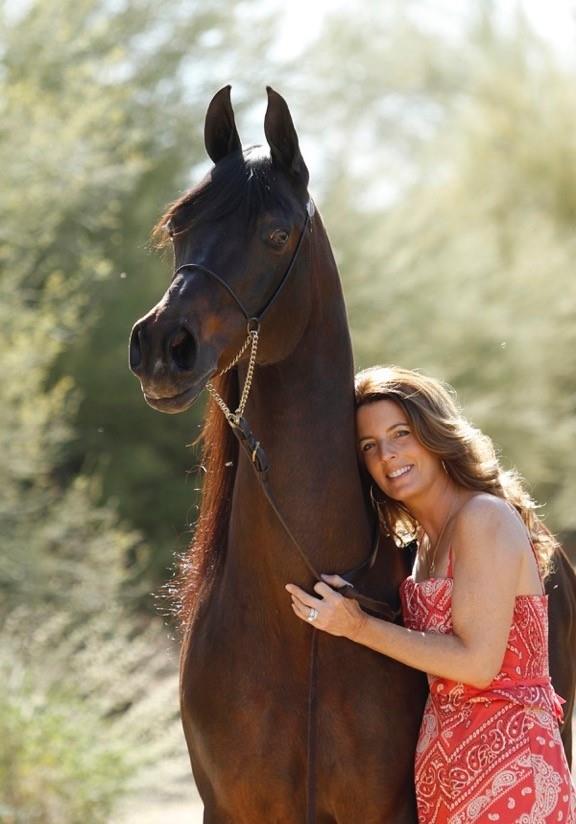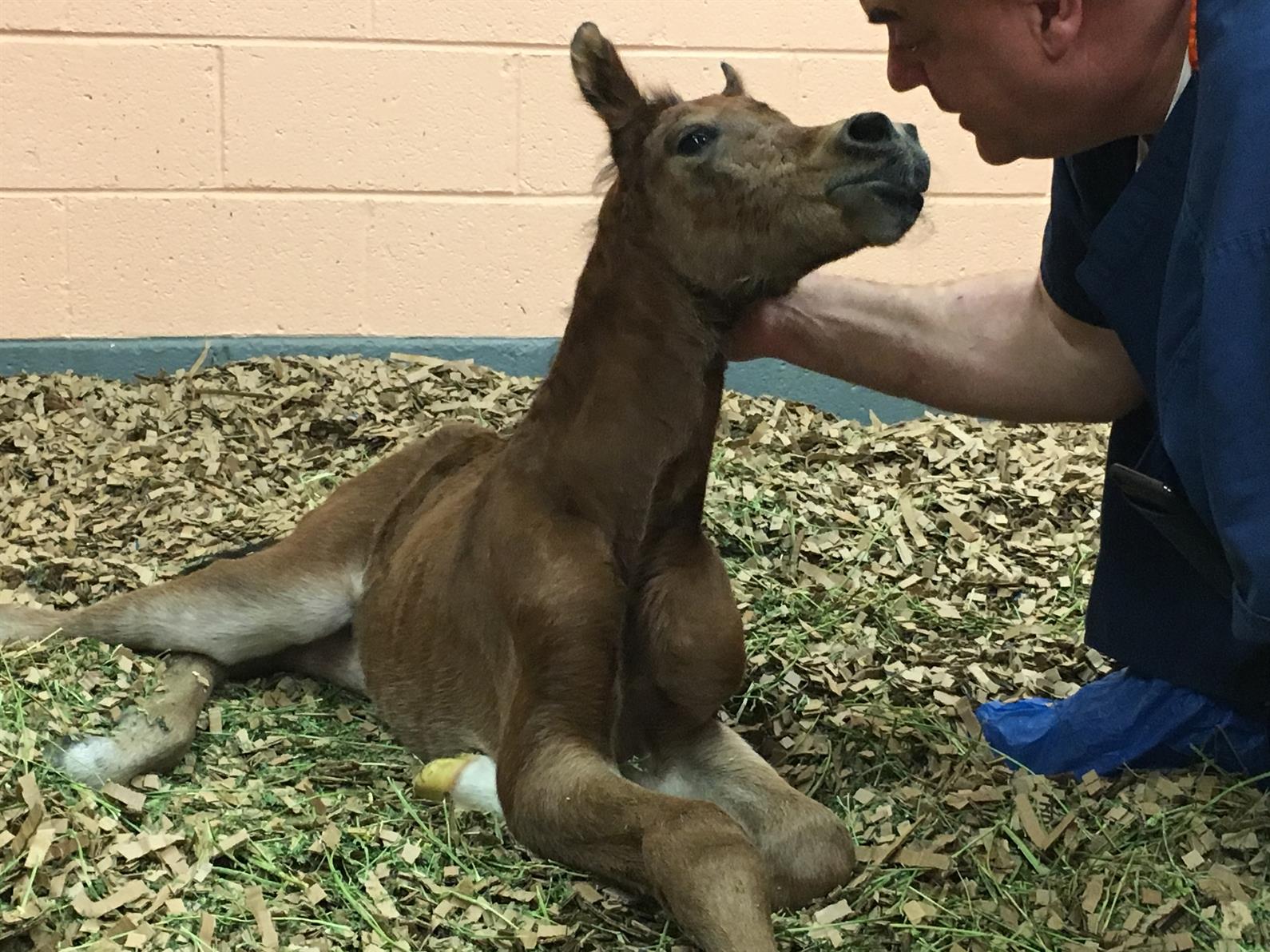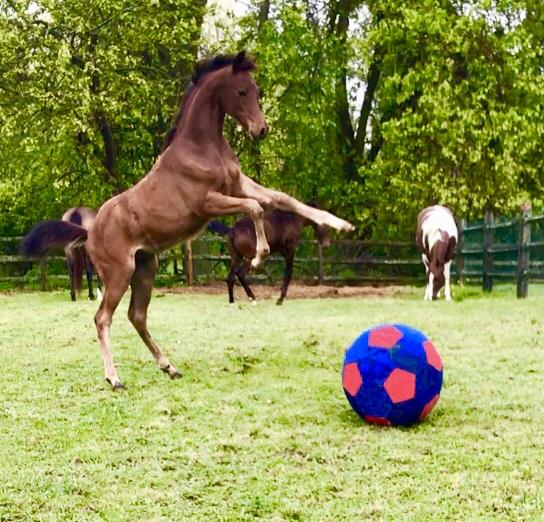When the yearlings Epona Elleison, Elle Vitorina, and Big Man in Town make their show-ring debut this spring in the halter division, they will mark an important milestone for owner/breeder Lisa Gaudio—and for equine reproductive science.

Photo: Javan Schaller
The trio are full siblings, by the Arabian stallion Vitorio TO and out of Gaudio’s beloved mare, Kyrie Elleison. Gaudio and her husband, Jim Kazanjian, call the foals Kyrie’s “Trinity of Miracles,” because they were conceived after the mare’s death in 2016, thanks to a remarkable procedure that involved a team of veterinarians in Pennsylvania and Texas, three surrogate broodmares, and owners who were determined to carry on their mare’s legacy.
“Horses are so grateful to you and they depend so much on you,” said Gaudio. “They have done so much for us, from God knows how far back in the world until now. For me, this is all about paying homage to a great mare’s spirit.”
The three foals—all by the Arabian stallion Vitorio TO—represent the fourth generation of Kyrie’s family to have a deep connection to Gaudio, who owned their great-granddam and bred both Kyrie and her mother, Sherry Baby.
“She was so different,” Gaudio said of Kyrie. “She was so human. There was a certain sense about her that was deeper than in most horses. She cared more about her people than she did about other horses. It’s not that she wasn’t exposed to being a normal horse, it’s just that even when she was a foal, she was just so different. My kids were raised with her, and she always would stop everything, even eating, to get attention or to talk to you. When she heard you, she would whinny, even when she was a foal. She had this weird communication with you.”
When Kyrie was two, Gaudio had to sell her during a divorce. Kyrie, who already had shown to regional halter championships with Gaudio, continued her show career, in both halter and under-saddle divisions. Eventually she was sold to Arizona, but by that point Gaudio had lost track of her. Then, in 2013, Gaudio visited the Arabian Horse Association booth at the Scottsdale Arabian Horse Show to look through their database for updated information on Kyrie. “There was a woman sitting next to me, and when I said the name of the farm where Kyrie was, she said, ‘Oh, I know that woman,’” Gaudio recalled. “There are probably 2,800 horses at that show, and she happened to know. She called the woman who had the farm, and the next day we went to visit Kyrie.”
Now age 17, Kyrie had developed laminitis. But she hadn’t forgotten Gaudio. “She whinnied the minute she heard my voice, and she smelled me up and down,” Gaudio recalled. “The woman said, ‘This mare belongs with you.’
“I don’t breed just to breed,” she said of her efforts to reunite with Kyrie. “I breed with the philosophy that if I can’t take them back and be responsible, then I won’t breed.”
Gaudio and Kazanjian put Kyrie in a rehabilitation program in Arizona for the next year, hoping her condition would improve enough for her to fly back east to Pennsylvania. In 2014, they got the go-ahead and brought Kyrie back east to their new property in Chadds Ford: Kyrie Arabians, named in her honor.

Photo: Javan Schaller
“I always say we actually bought this house for Kyrie,” Gaudio said with a laugh. “She flew from Phoenix, and I flew my vet, Dr. Jill Burton Acland from Unionville Equine, to go get her. She knew she was home. She was rearing and bucking! She had a happy life here.”
Conveniently, Kyrie Arabians was located just 15 minutes away (“Seventeen minutes in a trailer,” Gaudio says) from the University of Pennsylvania’s New Bolton Center veterinary hospital, and Kyrie traveled there every five weeks to visit Dr. James Orsini, associate professor of surgery, and Pat Reilly, the center’s chief of farrier services and director of the Applied Polymer Research Laboratory. “We bought a trailer that was designed for her to go in and right out for X-rays so she had less walking on the concrete,” explained Gaudio. “We put on an attachment to her stall so she had a 42’ by 42’ arena with nice, cushy sand to go out in. She got hand-walked, we bought her a TheraPlate, she had ice boots—we did everything we could do to save her.
“The [coffin bone] rotation had already taken its toll, but we got her in a good place metabolically, and her pain management was amazing,” Gaudio added. “We were on top of all that.”
Between the mare’s long absence and then her laminitis, Gaudio had never gotten the chance to breed Kyrie, although, at age 20, the mare continued to cycle normally at Kyrie Arabians. The idea was tempting, but ultimately a no-go. “I knew her pedigree, and I knew everybody in her background,” Gaudio said. “But it was for selfish reasons that we wanted a baby from her, and we couldn’t have done that to her,” Gaudio said.
But when Kyrie’s health began to decline, Gaudio decided to look into an intriguing procedure that she had heard about: collecting a mare’s eggs after death, letting them mature, and then injecting sperm and transferring the resulting embryo into a surrogate mare.
Gaudio discussed the option with Dr. Tamara Dobbie, Penn Vet’s associate professor of large animal reproduction. That conversation sparked what eventually became a plan to remove Kyrie’s ovaries after her death and try the assisted reproduction technique, which would take place at Texas A&M University’s Equine Embryo Laboratory. Read more details about the procedure in this piece from the University of Pennsylvania.
In February 2016, the time came to say goodbye. After a period of treatment at New Bolton, Kyrie returned home to Chadds Ford, where she was euthanized in her own stall. That started a series of carefully coordinated events that ultimately would lead to the birth of Kyrie’s “miracle” foals. Unionville Equine’s Dr. Jill Acland removed the mare’s ovaries, which were then sent quickly to New Bolton’s Hofmann Center for Animal Reproduction. There, Dobbie and her team set about the delicate work of recovering eggs, called oocytes. New Bolton shipped the oocytes from Kyrie overnight to Texas A&M, where they matured in vitro. Then, in a procedure called intracytoplasmic sperm injection or ICSI, each mature oocyte was injected with sperm from Vitorio TO that owner Janey Morse and Midwest Training Center also had shipped to Texas A&M. The process resulted in four embryos that were implanted in surrogate mares at Weatherford Equine Medical Center in Weatherford, Tex. Three of those resulted in pregnancies. In November 2016, Mercy, Peace, and Grace—the Quarter Horse mares carrying Kyrie Elleison’s foals—shipped to Kyrie Arabians to await their foaling dates.
On Jan. 16, 2017, the filly Epona Elleison was born to Mercy at New Bolton Center. She was followed by a colt, Big Man in Town, born to Peace on Jan. 22. Elle Vitorina, a filly out of Grace, arrived on Feb. 1.

Photo: Nick Gaudio
“That mare fought to the end, and I swear she wanted to leave those gifts,” Gaudio said of the remarkable fact that so many of the 20-year-old mare’s eggs developed into viable embryos.
“Epona is the spitting image of her mother,” Gaudio said. “It freaked everybody out. The only thing she has of Vitorio is two little white socks, just like his, on the back. She has the soul of her mother. There’s just something about her that’s like, ‘I’ve been here before; I’ve done this.’
“Big Man, he’s just a character. He likes to play with his ball, and he’s such a little soccer player. It’s hysterical. And Elle is the smallest one with the biggest attitude. She got up so fast after she was born that someone told me she’s probably the record-holder for it.”
Gaudio and Kazanjian kept Mercy, Peace, and Grace, who still live at Kyrie Arabians. Meanwhile, the three foals, whom Gaudio and Kazanjian fondly refer to as “the triplets,” have all entered training with Ted Carson at Butler Farms Training Center in White Oak, N.C., where they’ll get both halter and performance training.
Gaudio and Kazanjian drove the trip from Pennsylvania to North Carolina themselves, in a four-horse slant-load trailer they bought specifically for the trip. Also on board: plenty of toys.
“There were three wheelbarrows of toys that came out of the truck,” Gaudio said with a laugh. “We had a group of about eight people greeting us there when we arrived at Ted’s, because everyone knows about the triplets. It was hysterical.

“The babies get playtime together there,” Gaudio said of Butler Farms. “They’re learning to use the treadmill, they’re all standing up in the halter pose already—it’s amazing. They’re all quality foals, and they’re all a little different, and I think they’re all going to have three different versatilities for riding. I think Elle is going to be a country horse, an English horse. Big Man is huge—they think he’s going to be 16 hands—and he’s insanely beautiful; I think he’s going to be my Western horse. I’m not sure yet whether Epona is going to be a country horse or a big, beautiful hunter with a lot of movement. We haven’t quite figured her out yet, and she’s the one that has changed the most.”
All three will compete in halter classes this year. Current plans call for them to make their collective debut at the North Carolina Arabian Horse Association/Old Dominion Arabian Horse Association Combined Show in Raleigh, N.C., in early April.
“They just need to go a short distance and get settled into showing,” Gaudio said. “That will be their first show. Then they’ll go on to the Region 12 Championship Show in Perry, Ga., in May. And then, hopefully, they’ll go to U.S. Nationals in October.”
The two fillies will be competing against each other in their halter division at their first show in Raleigh, and so while Carson shows one, Gaudio will compete the other.
“The plan is, at the smaller show, I’m going to take Elle in, and Ted is going to take Epona in,” Gaudio explained. “That will be pretty exciting for us.”
Gaudio’s road to this point has been unusual but well worth it, she says. And she encourages other breeders to consider ICSI if they find themselves in a similar position. “It’s important for people to know that this can happen to anybody,” she said. “Anybody can do this. You have to have your ducks in a row, but the costs are not that crazy—and especially for a mare that you’ll never get back.”
To learn more about the Arabian breed, visit the Arabian Horse Association and US Equestrian's Arabian page. For more, US Equestrian members also can check out the Learning Center's breed-specific videos, including several about Arabians.
Want articles like this delivered to your inbox every week? Sign up to receive the Equestrian Weekly newsletter here.
This article is original content produced by US Equestrian and may only be shared via social media. It is not to be repurposed or used on any other website than USequestrian.org.


